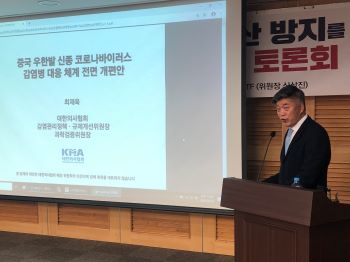A preventive medicine expert claimed that all patients with cold symptoms visiting a clinic should undergo a test for the new coronavirus to prevent local transmissions.
Choi Jae-wook, a professor at the Preventive Medicine Department of Korea University College of Medicine, said so at a debate on how to contain the Wuhan coronavirus outbreak, hosted by the conservative Liberty Korea Party at the National Assembly on Monday.

The government denied local infection in Korea but it failed to provide scientific evidence, Choi said. No such case has been reported because a majority of people with similar symptoms did not go through a test for the new coronavirus, he argued.
“We shouldn’t remain complacent about the number of confirmed patients staying at 27. Rather, we should think that the number 27 is just a beginning,” Choi said. “I don’t know why the government is saying there is no community infection. Unless we test the entire community, we don’t know the result.”
As the authorities warned about a risk of the asymptomatic infection, they do not know where or how the virus spread, Choi said. “We can’t be sure there is no control, concealment, or fabrication of information in Korea, just like what happened in China,” he added.
Singapore’s Prime Minister Lee Hsien Loong admitted local infections in a national address but local transmissions in Singapore occurred not because the country had a worse infectious disease control system than Korea, Choi said.
Under the premise that local transmissions have already occurred, clinicians should test all patients with fever for the new coronavirus infection, he said.
“The government should stop playing on words by saying there is no local infection. Rather than screening confirmed patients to contain the spread, the authorities should run an early diagnosis monitoring system,” he said.
Choi proposed more private medical institutions’ participation in the virus test, more compensation for infected patients, raising the alert to “serious” level, banning all Chinese from entering the country, and setting up a public-private emergency response task force.
Jeon Byung-ryul, former director of the Korea Centers for Disease Control and Prevention, also warned of the danger of local infections.
“The government should restrict the entry of Chinese people more strictly. If local transmissions get worse, some will be hospitalized with early cold symptoms, develop pneumonia symptoms, and even get worse to move to the intensive care unit,” Jeon said. “In this case, there could be a serious new coronavirus patient that the health authorities are unaware of.”
To brace for such scenarios, the government should help enhance negative pressure rooms, rooms for the treatment of those with serious symptoms, and immediate response teams, Choi said.
Checking them one by one could assure the public in case local infections get worse, he added.
Jeon, however, noted that early diagnosis and treatment in quarantine can cure an infected patient within 11-20 days in Korea.
“The Korean situation is different from that of China where patients fail to get proper treatment and develop severe symptoms. People do not have to be too anxious about the death risk of the new coronavirus,” he said.

